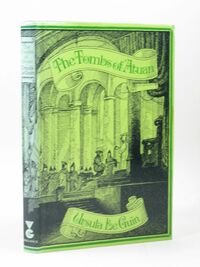You need to sign in or sign up before continuing.
Take a photo of a barcode or cover
I have no notes. This book was perfect, wonderfully imaginative and ahead of its time. I devoured it in one sitting.
adventurous
dark
medium-paced
Plot or Character Driven:
Character
Strong character development:
Yes
Loveable characters:
Complicated
Diverse cast of characters:
Yes
Flaws of characters a main focus:
Yes
This feels more novella than novel. I guess that’s the mark of good writing, when you read it in one evening and then say “but I want more!” Looking forward to the rest of this series.
Fantastic book. This adventure happens between two people, yet it's just as thrilling as if it were a grand voyage on a pirate ship.
Re-read in March 2014.
I love the feel to this book, slowly drawing you in with evocative language.
I love the feel to this book, slowly drawing you in with evocative language.
4.5/5
The first few chapters of this book were so dense and so uncaptivating that I thought, for a mere moment, that The Wizard of Earthsea had been a flash in the pan. A few chapters later, I was forcing myself to put the book down and go to bed lest I get too little sleep. If not for that opening, I think I could readily declare this the superior book of the two Earthsea entries I've read thus far. It's not as grand, and it doesn't delve into the technicalities of magic quite so much, but it's so much more human.
That element lays with our protagonist, Tenar. Whereas Ged in the previous book was a drifting soul who never found a home, Tenar has preexisting friends and allegiances, a place she can be truly familiar with - and, of course, the danger of losing these things that lay in all coming-of-age stories. There's little agency to be had for her and several times she acts against a character that we've grown to trust more than her. This is all to say that she's realistic. And when a story is a character drama, that's always appreciated.
Speaking of the story - it's a lot tighter this time around. Not to say that the looseness wasn't an advantage to the previous entry (it was) but the versatility of Le Guin proves itself to be an impressive thing. More than half of the story is spent within the same small location and everything outside of said location acts almost as an epilogue rather than as part of the actual story. Being a sequel is handled delicately, with just a small handful of recurring elements to serve veteran readers (I might be biased here since my favourite section of the previous book is brought back around and becomes a major plot element). If only the prose, which itself settles down into a much more appreciable level of detail, had started that way, this'd be a real winner.
The first few chapters of this book were so dense and so uncaptivating that I thought, for a mere moment, that The Wizard of Earthsea had been a flash in the pan. A few chapters later, I was forcing myself to put the book down and go to bed lest I get too little sleep. If not for that opening, I think I could readily declare this the superior book of the two Earthsea entries I've read thus far. It's not as grand, and it doesn't delve into the technicalities of magic quite so much, but it's so much more human.
That element lays with our protagonist, Tenar. Whereas Ged in the previous book was a drifting soul who never found a home, Tenar has preexisting friends and allegiances, a place she can be truly familiar with - and, of course, the danger of losing these things that lay in all coming-of-age stories. There's little agency to be had for her and several times she acts against a character that we've grown to trust more than her. This is all to say that she's realistic. And when a story is a character drama, that's always appreciated.
Speaking of the story - it's a lot tighter this time around. Not to say that the looseness wasn't an advantage to the previous entry (it was) but the versatility of Le Guin proves itself to be an impressive thing. More than half of the story is spent within the same small location and everything outside of said location acts almost as an epilogue rather than as part of the actual story. Being a sequel is handled delicately, with just a small handful of recurring elements to serve veteran readers (I might be biased here since my favourite section of the previous book
Spoiler
where Ged lands on the island with two abandoned people who give him a trinket
Le Guin returns to the world of EarthSea in this second volume, but here the hero of the first installment is a less central character. Our heroine, Tenar/Arha was chosen (and stolen?) as a child to serve as high priestess of the Nameless Ones. Le Guin draws a detailed picture of the strict parameters within which she is raised and taught her duties. It is a claustrophobic and stifling existence, and her interest in first capturing and then getting to know the Mage who has dared to invade her labyrinth, turns out to be key to her becoming capable of escaping the living hell within which she is trapped. It's a well-written and moving book that shows that LeGuin does not plan to mindlessly follow the tropes usually employed by male writers of fantasy and science fiction.
adventurous
reflective
slow-paced
Read A Wizard of Earthsea before this. It is extremely important to read this series in order.
This book has one of the craziest shifts from being a slog 1 Star book to being an absolute 5 Star classic. The start of the book is intentionally frustrating as it’s about a character breaking their acculturation and indoctrination. For anyone reading this, get to Arha meeting “the wizard” before giving up. I would also say that anyone frustrated by the simplicity apparent at the ending, buckle in for the next four books because nothing is simple, and Le Guin knew it when writing the end. This is the case of a book that has some weaker elements that are bolstered by the stronger whole.
My Earthsea Reviews:
A Wizard of Earthsea 4 Stars
The Tombs of Atuan 4 Stars
The Farthest Shore 4 Stars
Tehanu 5 Stars
Tales from Earthsea 4 Stars
The Other Wind 4 Stars
This book has one of the craziest shifts from being a slog 1 Star book to being an absolute 5 Star classic. The start of the book is intentionally frustrating as it’s about a character breaking their acculturation and indoctrination. For anyone reading this, get to Arha meeting “the wizard” before giving up. I would also say that anyone frustrated by the simplicity apparent at the ending, buckle in for the next four books because nothing is simple, and Le Guin knew it when writing the end. This is the case of a book that has some weaker elements that are bolstered by the stronger whole.
My Earthsea Reviews:
A Wizard of Earthsea 4 Stars
The Tombs of Atuan 4 Stars
The Farthest Shore 4 Stars
Tehanu 5 Stars
Tales from Earthsea 4 Stars
The Other Wind 4 Stars



